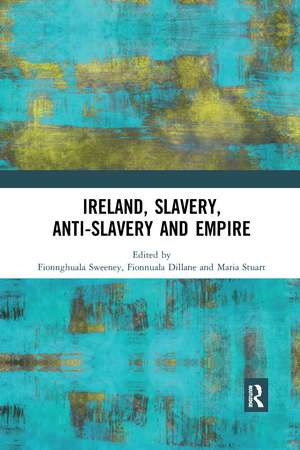Ireland, Slavery, Anti-Slavery and Empire
Editat de Fionnghuala Sweeney, Fionnuala Dillane, Maria Stuarten Limba Engleză Paperback – 14 aug 2020
This collection points to the particularity and significance of Ireland’s place in nineteenth-century exchanges around slavery and anti-slavery. Importantly, it foregrounds the context of empire – Ireland was both one of the ‘home’ nations of the UK, on many levels deeply complicit in British imperialism, and a space of emergent anti-colonial radicalism, bourgeois nationalism, and significant literary opportunity for Black abolitionist writers – as a key mediator of the ways in which the conceptual and practical responses to slavery and anti-slavery took shape in the Irish context. Moving beyond the transatlantic model often used to position debates around slavery in the Americas, it incorporates discussion around campaigns to abolish slavery within the empire, opening up the possibility of wider comparative discussions of slavery and anti-slavery around the Indian Ocean and the African continent. It also emphasizes the plurality of positions in play across class, political, racial and national lines, and the ways in which those positions shifted in response to changing social, cultural and economic conditions. This book was originally published as a special issue of Slavery & Abolition: A Journal of Slave and Post-Slave Studies.
Preț: 380.45 lei
Nou
Puncte Express: 571
Preț estimativ în valută:
72.80€ • 75.22$ • 60.56£
72.80€ • 75.22$ • 60.56£
Carte tipărită la comandă
Livrare economică 19 martie-02 aprilie
Preluare comenzi: 021 569.72.76
Specificații
ISBN-13: 9780367590260
ISBN-10: 0367590263
Pagini: 192
Dimensiuni: 174 x 246 x 5 mm
Greutate: 0.24 kg
Ediția:1
Editura: Taylor & Francis
Colecția Routledge
Locul publicării:Oxford, United Kingdom
ISBN-10: 0367590263
Pagini: 192
Dimensiuni: 174 x 246 x 5 mm
Greutate: 0.24 kg
Ediția:1
Editura: Taylor & Francis
Colecția Routledge
Locul publicării:Oxford, United Kingdom
Public țintă
Postgraduate and UndergraduateCuprins
Foreword – Ireland, slavery, antislavery, post-slavery and empire: an historiographical survey 1. Common ground: positioning Ireland within studies of slavery, anti-slavery and empire Part I – Bodies of Experience 2. ‘A Good Head and a Better Whip’: Ireland, Enlightenment, and the body of slavery in Marlon James’s The Book of Night Women 3. Colonial bodies and the abolition of slavery: a tale of two Cobbes Part II – Humanitarian Politics and Protest 4. Debating empire and slavery: Ireland and British India, 1820–1845 5 ‘This foul slavery-reviving system’: Irish opposition to the Jamaica Emigration Scheme 6. Black abolitionists, Irish supporters, and the brotherhood of man Part III – Geographies of Race 7. Failing to ‘unite with the abolitionists’: the Irish Nationalist Press and U.S. emancipation 8. Amalgamation, moral geography, and ‘slum tourism’: Irish and African Americans sharing space on the streets and stages of antebellum New York
Notă biografică
Fionnghuala Sweeney is Senior Lecturer in American Literature at Newcastle University, UK. Her research concentrates on American, African American and Caribbean literature and visual culture, literary connections between Ireland and the Black Atlantic, and Afromodernism. She has published widely in these areas and is author of Frederick Douglass and the Atlantic World (2008).
Fionnuala Dillane is Lecturer in nineteenth-century Literature at University College Dublin, Ireland, with research interests in Victorian authorship and print cultures, genre history and memory studies. Her most recent work includes Before George Eliot: Marian Evans and the Periodical Press (2013), joint winner of the Robert and Vineta Colby Scholarly Book Prize.
Maria Stuart is Lecturer in American Literature at University College Dublin, Ireland. Her research interests are in nineteenth-century American Literature, African American Literature, Crime Fiction and Dysfluency Studies. She is co-editor of The International Reception of Emily Dickinson (with Domhnall Mitchell, 2009).
Fionnuala Dillane is Lecturer in nineteenth-century Literature at University College Dublin, Ireland, with research interests in Victorian authorship and print cultures, genre history and memory studies. Her most recent work includes Before George Eliot: Marian Evans and the Periodical Press (2013), joint winner of the Robert and Vineta Colby Scholarly Book Prize.
Maria Stuart is Lecturer in American Literature at University College Dublin, Ireland. Her research interests are in nineteenth-century American Literature, African American Literature, Crime Fiction and Dysfluency Studies. She is co-editor of The International Reception of Emily Dickinson (with Domhnall Mitchell, 2009).
Descriere
This book explores Ireland’s role as a transnational hub of anti-slavery literary and political activity, emphasizing views from across class, political, racial and national lines. This book was originally published as a special issue of Slavery & Abolition.
